The Yiddish & Jewish Culture: Online Lecture Series
The Yiddish Book Center opens its classrooms to adult learners around the world through our Yiddish & Jewish Culture: Online Lecture Series. These lectures, which were presented and filmed at the Yiddish Book Center, span a wide variety of topics in modern Jewish history and culture and are led by top scholars, authors, and cultural commentators.
Each lecture series includes up to four video lectures, audio-only versions for listening on-the-go, and a lecture guide with descriptions of the lectures and a suggested reading list.
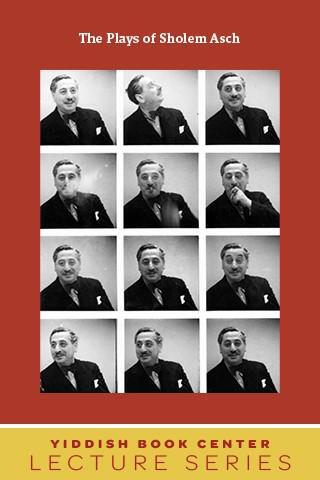
The Plays of Sholem Asch
with Joel Berkowitz, David Mazower, and Caraid O’Brien
Sholem Asch was Yiddish literature’s first modern celebrity, almost a one-man global brand. The obscenity trial surrounding his play Got fun nekome (God of Vengeance), as well as its frank depiction of two women in love, inspired Paula Vogel’s recent Broadway hit, Indecent—but Asch wrote over twenty more plays exploring interfaith love, the Jewish underworld, Messianic dreams, and class and power in the Jewish world. Explore Asch’s remarkable body of work in this lecture series, led by three leading scholars of Asch and the Yiddish theater. View a list of suggested readings here.
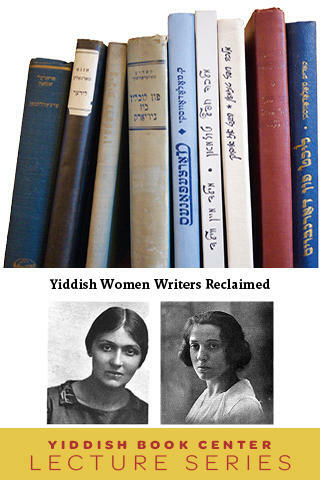
Yiddish Women Writers Reclaimed
with Professor Anita Norich
Women wrote poems, essays, plays, novels, and every other literary genre known to Yiddish literature. They wrote about love, family, politics, economics, class, sexuality, and the lure of the modern world and its dangers. Perhaps the most surprising thing about their writing is how little of it is known today. In this lecture series, Professor Anita Norich of the University of Michigan will examine Yiddish poetry and prose written by women, and discuss how these women claimed a place for themselves as modern Jewish writers. View a list of suggested readings here.
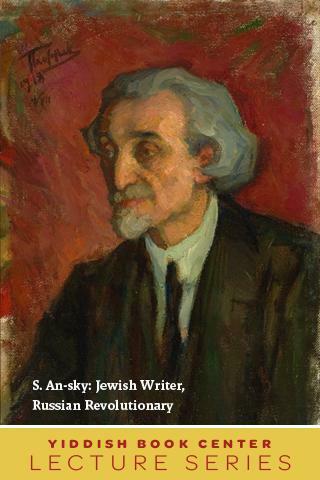
An-sky: Jewish Writer, Russian Revolutionary
with Professor Gabriella Safran
Best known for his remarkable Yiddish play The Dybbuk, S. An-sky (born Shloyme-Zanvl Rappoport, 1863–1920) was also an ethnographer and a keen observer of Jewish life in the Russian Pale of Settlement. His ethnographic expeditions in the years leading up to World War I gave us priceless photographs, musical recordings, and information about that soon-to-vanish world. Professor Gabriella Safran of Stanford University, author of the biography Wandering Soul: The Dybbuk’s Creator, S. An-sky, leads viewers through an exploration of this important writer, and the turbulent times in which he lived. View a list of suggested readings here.
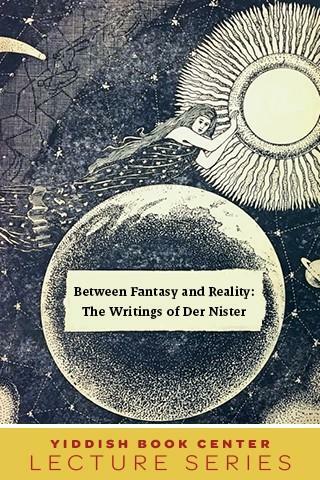
Between Fantasy and Reality: The Writings of Der Nister
with Professor Mikhail Krutikov
Der Nister (“The Recluse,” the literary pseudonym adopted by Pinkhes Kahanovich, 1884–1950) was the most enigmatic figure in modern Yiddish literature. Over the course of a dynamic career, he went from writing mystical, Symbolist stories to historical realism, and transformed himself from an obscure, mysterious artist into a communal activist. Living under the pressure of Stalin’s regime, he came to believe that the writer’s mission was to become witness to the people. In this lecture series, Professor Mikhail Krutikov of the University of Michigan will examine this mysterious Yiddish author’s work and his turbulent career in the Soviet Union. View a list of suggested readings here.
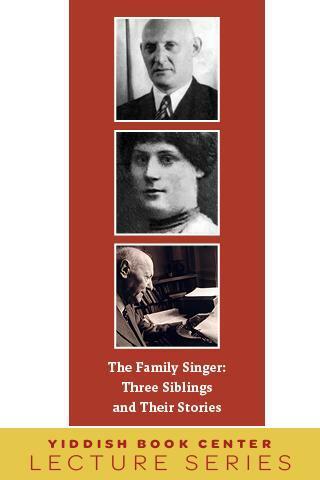
The Family Singer: Three Siblings and Their Stories
with Professor Anita Norich
While often overshadowed by the popularity and longevity of their younger brother Isaac Bashevis, both I. J. Singer and Esther Singer Kreitman were significant Yiddish authors in their own right. In these lectures, Yiddish literary scholar Anita Norich explores the three siblings’ different views of Jewish life and of Jews’ place in the world. View a list of suggested readings here.
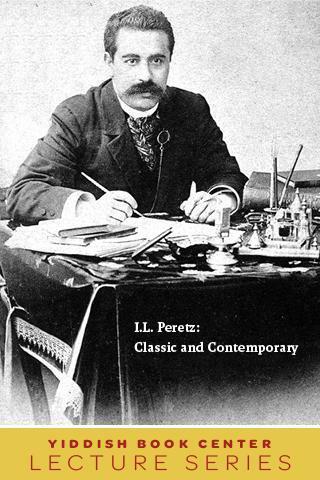
I. L. Peretz: Classic and Contemporary
with Professors Ruth Wisse and Justin Cammy
A century after his death in 1915, I. L. Peretz remains one of the modern Jewish writers to whom we continually return—not out of a sense of duty to the past, but because of what his work tells us about ourselves. This course, led by Professor Emerita Ruth Wisse of Harvard University and Professor Justin Cammy of Smith College, explores some of Peretz's liveliest writing as well as the context and milieu in which he wrote. View a list of suggested readings here.
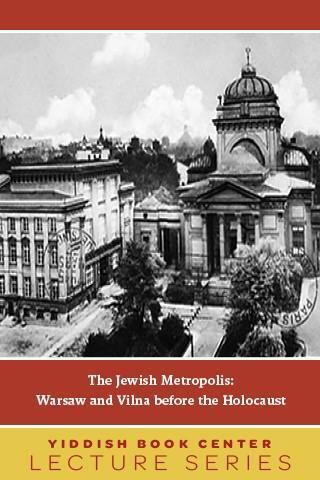
The Jewish Metropolis: Warsaw And Vilna Before The Holocaust
with Professor Samuel Kassow
This lecture series, led by Professor Samuel Kassow of Trinity College, focuses on the history of Warsaw and Vilna, two key cities in Ashkenazi Jewish history. View a list of suggested readings here.
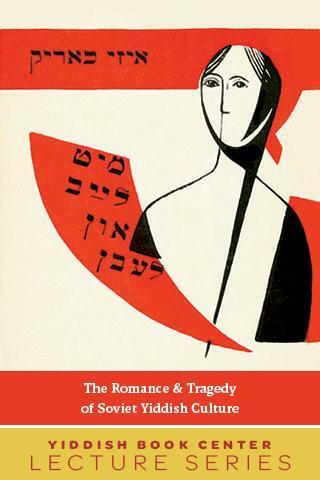
The Romance And Tragedy of Soviet Yiddish Culture
with Professor David Shneer
In 1919, the new Soviet state named Yiddish the “official language” of Soviet Jewry. To this day, Yiddish is still one of the state languages of Birobidzhan, the Jewish Autonomous Region of Russia. In the intervening years, Soviet Jewish culture-makers produced some of the most avant-garde, creative forms of Jewish culture anywhere in the world. At the same time, the Soviet state that had empowered them ended up destroying them and their culture, person by person, institution by institution. These lectures examine the romance of radical Yiddish culture and the tragedy that destroyed many of the most creative minds of that culture. View a list of suggested readings here.
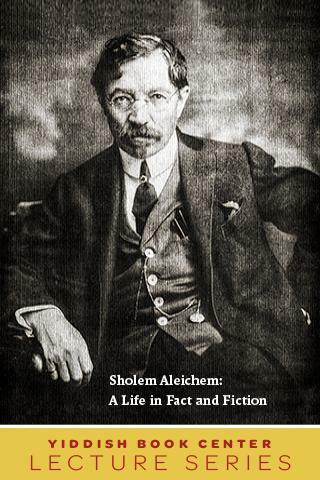
Sholem Aleichem: A Life in Fact and Fiction
with Professor Jeremy Dauber
Sholem Aleichem: A Life in Fact and Fiction is a lecture series by Professor Jeremy Dauber, the Atran Professor of Yiddish Language, Literature, and Culture in the department of Germanic languages at Columbia University, specializing in Yiddish and Jewish literature, American Jewish culture, and American studies.
Sholem Aleichem's stories are some of the most remarkable and beloved in Yiddish literature. Yet few know the writer’s equally remarkable life story or the depth of his literary and cultural legacy. In this series, Professor Dauber offers a fresh and fascinating look at the life and work of the most beloved Yiddish author, whose work provides a window into the world of Eastern European Jews as they began to confront the forces of cultural, political, and religious modernity that tore through the Russian Empire in the final decades of the nineteenth century. View a list of suggested readings here.
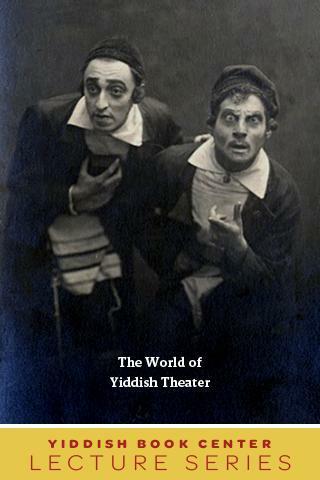
The World of Yiddish Theater
with Professor Debra Caplan
The World of Yiddish Theater is a lecture series by Debra Caplan, assistant professor of theater at Baruch College, CUNY. Professor Caplan will be your guide in this entrée into the history of Yiddish theater and dramatic literature, from early works and Purim plays to the "Father of Yiddish Theater," Avrom Goldfaden; from Yiddish theater’s arrival in America to its modernist turn in Europe between the two World Wars. View a list of suggested readings here.
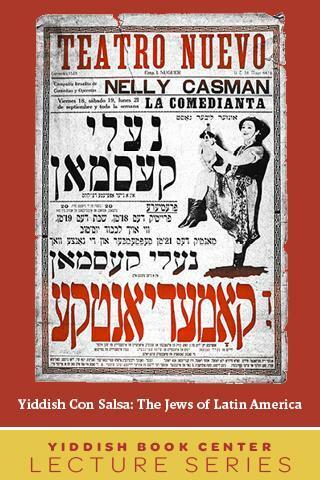
Yiddish con Salsa: The Jews of Latin America
with Professor Ilan Stavans
Yiddish con Salsa: The Jews of Latin America is a lecture series by Professor Ilan Stavans. The lectures address questions such as: Who are the Jews of Latin America? How have their lives and cultures been shaped by the history of Jews in Spain and Portugal, Russia and Poland? What is their place in the societies of South and Central America today? View a list of suggested readings here.
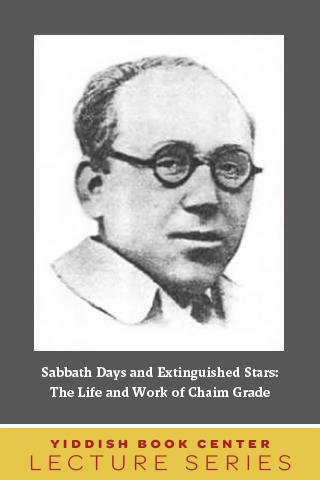
Sabbath Days and Extinguished Stars:
The Life and Work of Chaim Grade
with Joseph Berger, Justin Cammy, and David Fishman
Chaim Grade (1910-1982) was one of the most influential and celebrated Yiddish writers of post-Holocaust Europe and America. An author of poetry, fiction, and memoir, Grade explored the world of traditional and ordinary Jews in his hometown of Vilna, a city which, upon observing its destruction during the Holocaust, he left for America in 1948. After Grade’s death in 1982, his wife Inna Hecker Grade became protective of her late husband’s writings and reputation, effectively closing the door on public discussion about him or updated translations into English. This lecture series explores Grade’s life and work from the perspective of three speakers: Joseph Berger, the New York Times reporter who covered the death of Grade’s wife in 2010 and the ensuing controversy over rights to newly-discovered manuscripts; Justin Cammy, a literature scholar at Smith College; and David Fishman, a historian at the Jewish Theological Seminary of America and a friend of the late Grade. View a list of suggested readings here.
